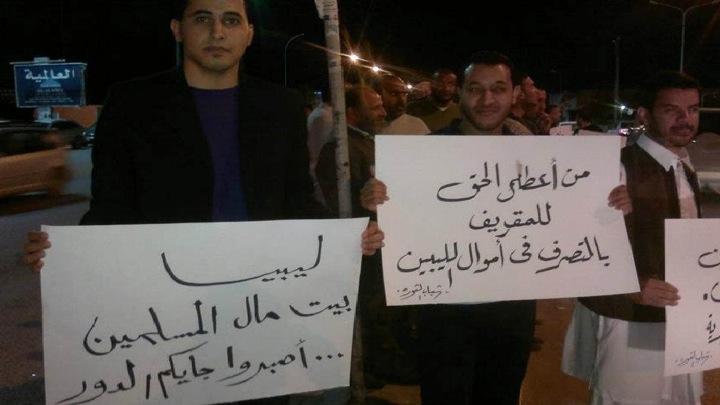By George Grant and Maha Ellawati.

Tripoli and Benghazi, 24 November:
Demonstrators gathered in front of Benghazi’s Tibesti Hotel following Friday prayers yesterday . . .[restrict]to protest over National Congress President Mohamed Magarief’s announcement of a $200 million development package to Tunisia.
The Congressman announced delivery of the funds alongside Tunisian President Moncef Marzouki during a visit to the country on Thursday.
The move has sparked protests on the streets and online, with objectors describing the move as “a waste of public money” and calling into question Magarief’s authority to make such a decision in the first place.
“Qaddafi used to squander Libya’s wealth outside the country for the past 42 years”, one protester in Benghazi said. “Now it seems Magarief has come to carry on this legacy”.
Demonstrators seemed largely to be of the view that this had been a unilateral decision by Magarief, and one he had no authority to make. “Who gave Magarief the right to dispose of Libyan money?” asked an angry group yesterday, adding that they did not elect 200 members of Congress only for one man to have all the power. The protesters also demanded a separation of powers between the legislature and the executive, which they claimed was absent from Libya at present.
What was missed, however, is the fact that this loan was agreed upon several months ago, right around the time that Tunisia agreed to the extradition of former Libyan Prime Minister Baghdadi Al-Mahmoudi.
“This is an old decision made by the NTC and the Kib Government”, said Benghazi Congressman Alaeddin Magarief. “It was agreed just before the handover [from the NTC to the Congress]. There was some discomfort from GNC members at the time, but nothing we could have done, because it was already approved”.
Mahmoudi was extradited back to Libya on 24 June, just under a fortnight before the 7 July Congress elections. At the time, it was widely rumoured that a deal had been struck with the Tunisian government to secure the exchange, including offers of cut-price oil supplies along with a multi-million dollar investment.
Tunisia’s Justice Minister Noureddine Bhiri vigorously denied any suggestions of a financial deal, insisting that “the extradition process took place after completion of all legal justifications by the relevant judicial authorities”.
Whilst the Libya Herald has received no official confirmation that the $200 million loan was directly linked to the Mahmoudi extradition, it is known that a similar deal was struck over the extradition of Qaddafi’s former spy chief Abdullah Senussi a little over two months later.
Coincidentally, it was rumoured at the time that the Libyan government had agreed to invest $200 million in the impoverished West African state, although the government denied that any direct payment had been made.
“We have agreed to increase the level of Libyan investment in Mauritania, but I cannot give a specific figure”, a senior official told the Libya Herald on the day of Senussi’s extradition on 5 September. “However, there has been no direct financial payment to the Mauritanian government in exchange for Senussi’s release.” Asked if the new investments were a direct response to Mauritania’s decision to hand over Senussi, the official replied, “of course”.
Contacted by the Libya Herald, the office of Prime Minister Ali Zeidan said it was unable to comment on the Tunisia loan as the prime minister was not making statements on any issue for the next week whilst he finalised the makeup of his government.
Neither Congress spokesman Omar Hmaidan nor Mohamed Magarief himself could be contacted today.
Officials have said that the $200 million is a loan, not a gift, and will be repaid to Libya in full. It is also being reported that the package is $100 million loan and $100 million gift, but this has not been verified as yet.
[/restrict]









